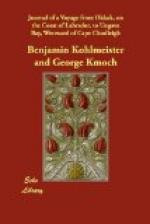27th. We proceeded farther up the river, accompanied by most of the men, and some women, in their skin-boat, and arrived at a bay, which, by the winding of the stream, appears like a lake, surrounded on all sides with gently rising grounds, well planted with wood of moderate size, chiefly larch. Behind the wood are some low hills. We named this place Unity’s Bay. There is here a very good place for a Missionary settlement. A fine slope extends for about half an English mile, bounded on each extremity by a hill, on each of which we erected high signals. The land is even and dry. Juniper, currants, and other berries, grow here in abundance, and rivulets run out of the wood at a distance of a few hundred paces from each other. The slope faces the S.S.E. and we named it Pilgerruh, (Pilgrim’s rest). Brother Kohlmeister made drawings of the situation.
From our first arrival we had improved every opportunity of making the Esquimaux acquainted with the chief aim of our visit to this country, and addressed them both singly and in companies. Nor were Jonathan and Jonas remiss in conversing with them about the concerns of their immortal souls, declaring to them the love of God our Saviour towards them. We once met with Sybilla, Jonathan’s wife, seated with a company of women, under the shadow of a skin-boat, set on edge, exhorting them, with great simplicity and fervour, to hear and believe the gospel.
28th. Brother Kmoch landed with Jonathan, and spent some hours in examining the banks of the river. On ascending the first eminence, the view of the interior is in general flat, with a few low hills, and ponds in some places, full of wild geese. The timber in the woods hereabouts is not large: we found none fit for masts. The largest trees were not more than eight inches in diameter, and fifteen or twenty feet high. They are chiefly larch and pines. In some places we found them burnt or withered, and were informed by the Esquimaux, that it was the effect of the Indian’s fires. Indeed we saw several places where the Indians had put up huts, and left sufficient vestiges of their abode. Berries grow everywhere, and between the river and the wood, the plain is chiefly covered with willows, high grass growing between them, but these and the various shrubs are so low, that a man can easily look over them. In all directions we saw the tracks of reindeer, and there is every appearance of its being a place much frequented by these animals. Deeper in the wood, we found great quantities of sorrel and other European plants. The woods appeared very thick, and extended as far as the eye could reach, often coming down to the edge of the river. The Esquimaux say, that higher up, large timber is found. On our return to the skin-boat we found ourselves pretty much fatigued, and ready to partake of a supper, cooked by the Esquimaux, consisting of ship’s biscuit, dried fish, and raw whitefish blubber. The Esquimaux prevailed upon Brother Kmoch to taste the latter, and he reported, that having once overcome his aversion to it, its taste was sweet, like the kernel of a nut, but heated his stomach like a hot posset.




